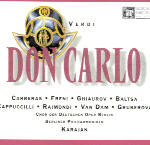This 1978 recording of the four-act version of Verdi’s Don Carlo has always been controversial. Many have found it too symphonic and indeed, Herbert von Karajan’s attention to detail, slow tempos, and highlighting of individual instruments certainly turn it into something other than a truly theatrical experience. And the volume problems still exist: loud passages are so-o-o-o loud that you’ll find yourself leaping up to lower the volume whenever they occur, only to realize that some soft passages are actually taking place a moment later where you thought there had been a pause in the music. It’s enough to make you scream. Other negatives are the somewhat worn (though still effective) Philip of Nicolai Ghiaurov and the fact that Ruggero Raimondi as the Grand Inquisitor sounds as menacing as the Flying Nun. So what’s good? Well, everything else: This is José Carreras almost in his prime, singing with gorgeous tone and great passion and intelligence; the same goes for Agnes Baltsa’s Eboli–rich and complicated as well. Mirella Freni’s Elisabetta is ravishing and noble, while Piero Cappuccilli’s Posa, though not as alluring as some, is strong and valid. Edita Gruberova as Tebaldo, José van Dam as a monk, and Barbara Hendricks as The Heavenly Voice are great luxuries. Add to this the almost otherworldly-beautiful playing of the Berlin Philharmonic and this, though weird, is irresistible.
































